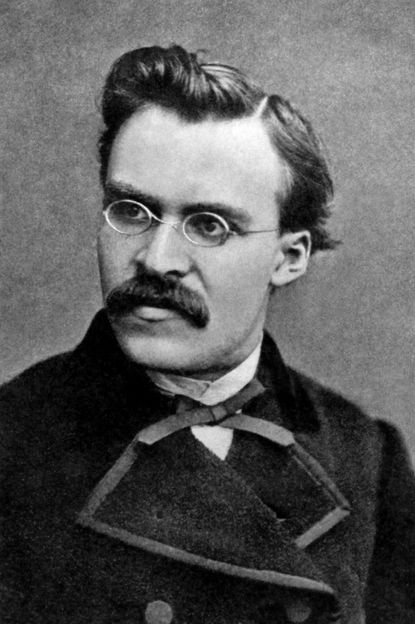The troubling rise of Bad Nietzsche
The alt-right loves Nietzsche the same way 20th-century fascists loved Nietzsche


Bad Nietzsche is back. And he's being co-opted by the alt-right.
You can see it in a personal, highly compelling profile of Richard Spencer, the now-famous white nationalist who was a former high-school classmate of The Atlantic's Graeme Wood, who traces Spencer's descent into disrepute to an encounter with Nietzsche.
"He developed intellectually after a swift kick in the cortex from Richard Wagner and, ultimately, Friedrich Nietzsche, the 19th-century German philosopher whose skepticism of democracy and egalitarianism later made him beloved by the Nazis," Wood writes.
Subscribe to The Week
Escape your echo chamber. Get the facts behind the news, plus analysis from multiple perspectives.

Sign up for The Week's Free Newsletters
From our morning news briefing to a weekly Good News Newsletter, get the best of The Week delivered directly to your inbox.
From our morning news briefing to a weekly Good News Newsletter, get the best of The Week delivered directly to your inbox.
"You could say I was red-pilled by Nietzsche," Spencer told me. To "red-pill," in alt-right slang, is to enter a vertiginous spiral of awakening and reassessment. … The false dreams from which Spencer found himself freed were the dreams of the good ol' boy, who goes to church on Sunday and does things as his granddaddy did before him. Spencer started off with Nietzsche's On the Genealogy of Morals, a systematic dismantling of the moral and religious truths of European civilization. Nietzsche saw Christianity as a slave religion, a consolation to the weak. Spencer says that the general effect, an inversion of his moral universe, was "shattering." [The Atlantic]
Despite all the media attention he garners, Spencer remains a marginal figure. Still, this is extraordinary. And it makes me wonder what the late Allan Bloom would think.
Bloom was a University of Chicago-based professor of philosophy and classical literature whose book The Closing of the American Mind was a publishing phenomenon in the late 1980s. Subtitled How Higher Education Has Failed Democracy and Impoverished the Souls of Today's Students, the book was an unlikely bestseller about how the Western elite was trashing its civilizational inheritance and trying to build a new edifice on the sands of relativism and egalitarianism. It featured a forward by Bloom's friend, the Nobel Prize-winning novelist Saul Bellow, who had attracted a fair bit of ignominy for having asked, allegedly tauntingly, why Zulus and Papuans hadn't produced great literature (a remark to which he offered extenuating context here).
The Closing of the American Mind makes for interesting reading today. The thrust of its complaint about elites and relativism has only intensified. But some of it does not hold up well at all. Take its snarkily written chapter with the heading "The Nietzscheanization of the Left or Vice Versa," for example. In it, Bloom argued that the left had largely abandoned the discredited economic doctrines of Marx and, in their place, adopted a stylized anti-bourgeois Nietzsche. Nietzsche and his "will to power" over flabby liberal values no longer sustainable by reason or myth were still casting a revolutionary spell, Bloom asserted, but it was no longer over adherents of German and Italian fascism, discredited (to say the least) as those movements were by the horrors of World War II.
Nietzsche's thought was now being transmitted through European leftists such as Georg Lukacs, Alexandre Kojeve, Maurice Merleau-Ponty and Jean-Paul Sartre, who had jettisoned Marx's "embarrassing economic determinism" and created a new "mutant" crossbreed of Nietzsche and Marx:
The mature Marx had almost nothing to say about art, music, literature, or education, or about what the life of man would be when the yoke of oppression was lifted. His early "humanistic" writings were looked by some for the inspiration lacking in the later ones, but they turned out to be thin and derivative stuff. Since the Nietzscheans spoke so marvelously well about all these things, why not just appropriate what they said? So they took over "the last man," whom they identified with the Marx's bourgeois, and "the superman," whom they identified with the victorious proletarian after the revolution. [The Closing of the American Mind]
Without crawling further into the weeds, suffice it to say that, in 2017, the philosophical picture that Bloom painted in 1987 has been inverted. In the post-crash, post-Picketty era of global inequality, the Marxist-minded left is very much interested in those discarded economic doctrines. And the far right, as evidenced by Spencer and his ilk, is very much interested in Nietzsche as he was originally understood by 20th-century fascists.
Today's alt-right warriors take their Nietzsche neat.
Politics is a zero-sum game, Spencer told Wood; its end product is not derived from consensus or compromise. There is a winner and a loser: "It's nonconsensual by its very nature. The state is crystallized violence." That is a scary thought. And I've no doubt that this is not at all what Bloom meant when he urged his students to be "open to closedness" — that is, to be open to the notion that some of life's big questions about existence and morality might have definitive answers.
Bad Nietzsche is back. And Allan Bloom would be appalled.
Create an account with the same email registered to your subscription to unlock access.
Sign up for Today's Best Articles in your inbox
A free daily email with the biggest news stories of the day – and the best features from TheWeek.com
Scott Galupo is a freelance writer living in Virginia. In addition to The Week, he blogs for U.S. News and reviews live music for The Washington Post. He was formerly a senior contributor to the American Conservative and staff writer for The Washington Times. He was also an aide to Rep. John Boehner. He lives with his wife and two children and writes about politics to support his guitar habit.
-
 In what countries is assisted dying legal or in consideration for being made legal?
In what countries is assisted dying legal or in consideration for being made legal?In the spotlight More countries are granting more people the right to die
By Devika Rao, The Week US Published
-
 5 captivating books to read in May
5 captivating books to read in Maythe week recommends Brittney Griner tells her own story, a coming-of-middle-age novel and more
By Theara Coleman, The Week US Published
-
 The secretive practice of 'catch-and-kill' tabloid journalism
The secretive practice of 'catch-and-kill' tabloid journalismThe Explainer Outlets such as the National Enquirer have become infamous for using the practice
By Justin Klawans, The Week US Published
-
 Arizona court reinstates 1864 abortion ban
Arizona court reinstates 1864 abortion banSpeed Read The law makes all abortions illegal in the state except to save the mother's life
By Rafi Schwartz, The Week US Published
-
 Trump, billions richer, is selling Bibles
Trump, billions richer, is selling BiblesSpeed Read The former president is hawking a $60 "God Bless the USA Bible"
By Peter Weber, The Week US Published
-
 The debate about Biden's age and mental fitness
The debate about Biden's age and mental fitnessIn Depth Some critics argue Biden is too old to run again. Does the argument have merit?
By Grayson Quay Published
-
 How would a second Trump presidency affect Britain?
How would a second Trump presidency affect Britain?Today's Big Question Re-election of Republican frontrunner could threaten UK security, warns former head of secret service
By Harriet Marsden, The Week UK Published
-
 'Rwanda plan is less a deterrent and more a bluff'
'Rwanda plan is less a deterrent and more a bluff'Instant Opinion Opinion, comment and editorials of the day
By The Week UK Published
-
 Henry Kissinger dies aged 100: a complicated legacy?
Henry Kissinger dies aged 100: a complicated legacy?Talking Point Top US diplomat and Nobel Peace Prize winner remembered as both foreign policy genius and war criminal
By Harriet Marsden, The Week UK Last updated
-
 Trump’s rhetoric: a shift to 'straight-up Nazi talk'
Trump’s rhetoric: a shift to 'straight-up Nazi talk'Why everyone's talking about Would-be president's sinister language is backed by an incendiary policy agenda, say commentators
By The Week UK Published
-
 More covfefe: is the world ready for a second Donald Trump presidency?
More covfefe: is the world ready for a second Donald Trump presidency?Today's Big Question Republican's re-election would be a 'nightmare' scenario for Europe, Ukraine and the West
By Sorcha Bradley, The Week UK Published